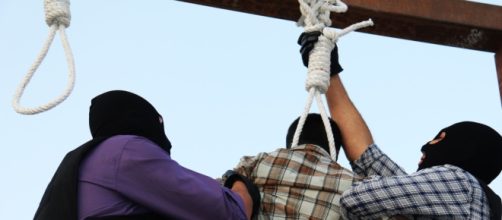Reports are circulating that Iran has carried out a mass execution of Sunni Kurds at the infamous Rajai Shahr Prison, located just west of Tehran. Reports indicate that between 10 to 36 Kurds were executed. The National Council of Resistance of Iran pegs the number at 21, based on information from families of those executed.
Iranian authorities contacted families to let them say their final goodbye, but apparently carried out the mass execution ahead of schedule. Many families were told that they were too late, that their loved ones had already been hung, and that they needed to collect the bodies.
Iranian dissidents speak out
Maryam Rajavi, a leading Iranian dissident and president-elect of the National Council of Resistance of Iran (NCRI) called the acts “an appalling crime against humanity."
“This inhuman crime took place simultaneous with the anniversary of the 1988 massacre of 30,000 political prisoners in Iran," stated Mohammad Mohaddessin, the Chairman of the Foreign Affairs Committee ofNCRI. "The mullahs' regime is facing absolute social isolation and widespread abhorrence by the people and thus is resorting to increased executions to create a climate of fear and to prevent the possibility of a nationwide uprising." He said that more than 2500 people have been executed under Hassan Rouhani, "who falsely claimed to seek moderation.”
Rouhani not as reform-minded as he seems?
Hassan Rouhani has often been painted as a reform-minded moderate.
He recently announced that he was postponing the civil service entrance exam and ordered government branches to reconsider whether or not the 3,000 open positions currently within the Iranian government were biased in favor of men.
In Iran, women make up approximately 60% of university graduates, but only about 12% of women are actively employed. Rouhani has made an effort to reach out to women and decrease segregation. With the hijab still a required attire, and numerous other repressive laws in place, however, Iran's actual commitment to reform is questionable at best.
Small efforts at reform come as executions rise
While Rouhani has made some progress on certain issues – women have been posted to senior level positions within the government, for example – executions have continued to steadily climb.
Iran trails only China, a country more than ten times its size, when it comes to executions.
Iran's executions have already been decried by numerous international non-profits. Many of those executed are dissidents, or else caught up in Iran's widespread drug trade.
It's believed that Iran has now executed at least 2,500 prisoners so far this year. As of April, Amnesty International had reported a 31% in the number of executions carried out. According to the organization, 58 of the executions were carried out in public. Further 16 women and four juveniles had been executed.
The actual trial system and legal environment in Iranare also highly suspect. Many prisoners have reported that they have been tortured and forced into signing false confessions. With the court system heavily influenced by the ruling regime, it's doubtful that many Iranians ever receive a fair trial.

